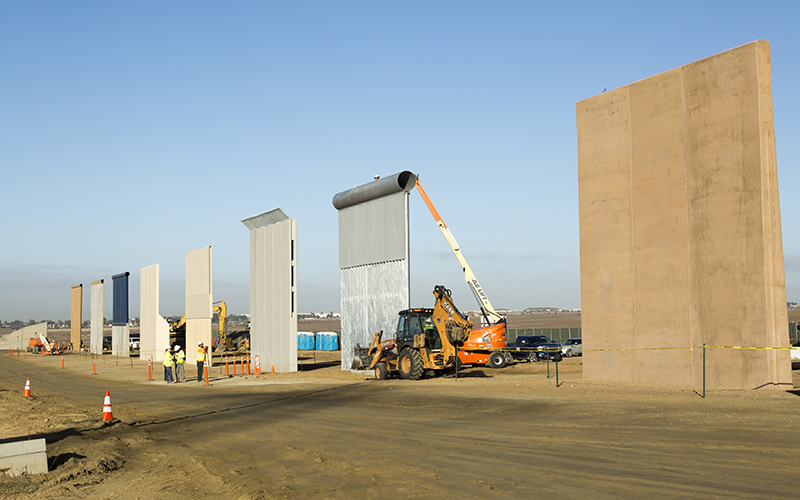
Ground views in this file photo from last year of different sections of border wall as they take shape during the Wall Prototype Construction Project near the Otay Mesa Port of Entry in San Diego. For the last 12 years, the Department of Homeland Security has been able to waive regulations that interfere with wall construction. (Photo by Mani Albrecht/U.S. Customs and Border Protection)
WASHINGTON – A House committee voted Wednesday to rescind the law that lets the secretary of Homeland Security waive regulations that get in the way of a border wall, a move critics say is used increasingly by the Trump administration.
The 17-12 vote by the House Homeland Security Committee split along party lines, with Democrats saying the bill is needed to correct an overreach by the White House.
“No secretary, whatever the purpose or intent, should have the ability to waive every law in their entirety without congressional review or oversight,” said Rep. Kathleen Rice, D-New York, and author of the bill.
But Republicans said the waiver should remain so the secretary can respond to what Rep. Mike Rogers, R-Alabama, called the “growing humanitarian crisis at the southern border that we cannot ignore.”
Rogers said the government must control the flow of illicit drugs and sex trafficking at the border.
“The only way to do this is to secure our border,” he said.
The Department of Homeland Security did not immediately respond for a request for comment on the bill. Its future in the Republican-controlled Senate is uncertain.
Rice’s bill, the Rescinding DHS’ Waiver Authority for Border Wall Act, would reverse a 2006 change to the Illegal Immigration Reform and Immigrant Responsibility Act that said the secretary could waive “all legal requirements” in order to construct barriers along the border.
Rice said the waiver was used five times during the tenure of President George W. Bush, and never by President Barack Obama. But she said it has already been invoked six times since President Donald Trump took office, as he pursues his campaign pledge to build a wall on the border with Mexico.
Wednesday’s vote was not the first challenge to the waiver. The Tucson-based Center for Biological Diversity has three lawsuits pending against the administration for border wall action in Texas, New Mexico and California.
“It’s outrageous that the Trump administration is sweeping aside bedrock environmental, health and safety laws to speed destructive border wall construction,” Paulo Lopes, public lands policy specialist at the Center for Biological Diversity, said in a statement.
“Congress needs to stop Trump’s blatant executive overreach and require the administration to comply with laws that protect people, wildlife and public lands,” said the statement, which welcomed Rice’s bill.
Rep. Bennie Thompson, D-Mississippi, said that when the Bush administration used the waiver in 2008, it resulted in “catastrophic damage,” pointing to a rainstorm in Nogales.
“A storm run-off channel was blocked by a 5-foot-tall concrete barrier that DHS built without any consideration to federal, state, or local environmental zoning laws,” Thompson said at the committee hearing.
He said the barrier prevented stormwater from reaching a water treatment center and “placed such pressure on underground pipes” that it caused a 10-foot sinkhole, leading to more than $8 million in damage to downtown Nogales.
Rep. Peter King, R-New York, criticized Democrats on the panel, pointing out that when the waiver was first put in place, it was “strongly supported by those who oppose it today.”
But Rep. Val Demings, D-Florida, asked the committee to consider it as a private property question, noting that the waiver could leave those affected with “no legal recourse.”
“This allows an unelected official of the executive branch to ignore Congress and largely bypass the judicial branch,” Demings said. “This unchecked power is unconscionable, and it should not be allowed.”